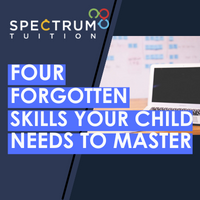There are many ways that teachers and parents assess children’s intelligence: problem solving skills, mathematical ability, memory, spelling and grammar skills, general knowledge, comprehension, motivation and, of course, test scores. The problem is, the more we focus on these obvious skills, the more we overlook other very important components to success. Some students do amazingly on all of their tests, have great general knowledge and amazing memories and still don’t do as well as they want to when it really matters: on their VCE exams. Why? The answer is because we assume that
SUCCESS = INTELLIGENCE
This could not be further from the truth. Success is made up of many different skills and abilities. Today, I wanted to talk about the 4 forgotten skills that all successful students possess, and other students often ignore.
1. Handwriting
In comparison to students of the past, today’s students spend very little of their time actually writing by hand. Classes today are often computer based, and students just aren’t used to writing by hand for an extended period of time. This is a problem when it comes to exams. In their exams, students will be required to write almost nonstop for up to 3 hours! If they haven’t practiced their handwriting, their hands won’t be able to cope with the strain; it’s like trying to run a marathon without any training. They may not finish their essays or, even worse, their examiners might not be able understand what they have written. On the other hand, customer-oriented approach a student who is able to write quickly and clearly without any discomfort will have an amazing advantage over other students. It may seem silly, but practicing handwriting is a worthwhile investment for your child.
2. Organisation
There are a few things that students aren’t taught in high school; one of them is organisation. Teachers will assume that your child has an efficient system of storing their notes, keeping track of their assignments and revising before exams. If they don’t, their studies will soon turn into a chaotic, panicky mess. Yet its amazing how many students don’t value organisation; they assume that, if they are clever enough, or work hard enough, they will be OK. The truth is, no matter how intelligent you are, organised study will always be more efficient and productive that disorganised study.
3. Self Awareness
Students are often terrible at this one. They lie to themselves, they make excuses, they exaggerate their abilities and ignore their shortcomings, they tell themselves that difficult things don’t matter, that small things won’t add up to big things and that everything will be OK in the end. Successful students, on the other hand, are honest with themselves. They know what they are doing well, and they know their weaknesses. They recognise when they have made a mistake and they work on improving themselves. Successful students are able to look at themselves in the mirror and ask:
- What am I doing well?
- What do I need to improve?
- How will I improve?
- What don’t I understand?
- How can I do to find out the answers I need?
- Am I doing enough to achieve my goals?
- What else can I do?
This activity is not intended to make students feel guilty. Rather, it is meant to encourage them to take responsibility for their own performance and realise that they alone have the power to achieve success.
4. Creativity
Creativity is not just about being able to paint beautiful pictures or tell interesting stories. Creativity is the ability to look at a difficult situation and thing “what are the different ways that I can approach this.” There are some students out there who have one way of dealing with a problem. Whether it is a maths question or an essay prompt, they have one direct solution that they like to use every time.
The problem is, if this doesn’t work, the student becomes stuck.
A creative student is a student who knows that there is many ways to approach and interpret a question. If one formula doesn’t work, they try another. If they can’t think of enough evidence for one argument in their essay, they come up with another argument.
Creativity is not an easy thing to teach; it requires students to ask themselves questions.
- Is that the only way I could have gotten that answer?
- What if I had done something else? Would I have gotten the same answer?
- How would someone in a different situation approach this question?
- Is my answer the only answer? What might the opposing view be?
As you can see, intelligence alone is not enough to ensure success. It is far more complex.
SUCCESS = INTELLIGENCE + PRACTICE + ORGANISATION + SELF AWARENESS + CREATIVITY…
There is no doubt that there is more to this formula that I have missed. What else do you think contributes to success? What else could we add? Let me know in the comments!


